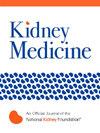Acute Kidney Injury, Mild Cognitive Impairment, and Dementia: A Cohort Study of Patients from SPRINT
IF 3.2
Q1 UROLOGY & NEPHROLOGY
引用次数: 0
Abstract
Rationale & Objective
It is well accepted that acute cognitive dysfunction and delirium can occur with severe acute kidney injury (AKI). Recent evidence has indicated AKI can contribute to incident dementia years later. However, these observations were limited by lack of adjudication in most of these studies and greater severity of AKI.
Study Design
A retrospective cohort study.
Setting & Participants
8,148 older adults at high cardiovascular risk enrolled in the Systolic Blood Pressure Intervention Trial (SPRINT).
Predictor
Adjudicated AKI as a time-varying predictor.
Outcomes
Incident mild cognitive impairment (MCI), probable dementia, and their composite.
Analytical Approach
Cox proportional hazard models.
Results
Participants were 68 ± 9 years, 65% male, 28% with prevalent chronic kidney disease), with a median (interquartile range) follow-up time for the composite of 4.0 (2.1-5.4) and 4.6 (3.6-5.9) years in the AKI and non-AKI groups, respectively. The incidence rate of MCI, probable dementia, and their composite was higher in participants who experienced an AKI event (n = 270). In the fully adjusted model, AKI was positively associated with probable dementia (hazard ratio, 1.72; 95% CI, 1.07-2.75) and the composite outcome (1.43 [1.01-2.04]).
Limitations
AKI before baseline was not captured; retrospective and associative.
Conclusions
Adjudicated AKI, which was largely mild and reversible, was independently associated with increased risk of probable dementia and the composite of probable dementia and MCI in older adults at high cardiovascular risk.
Plain Language Summary
It is well accepted that acute cognitive dysfunction and delirium can occur with severe acute kidney injury (AKI), and recent evidence has indicated that AKI can contribute to new onset of dementia years later. We examined whether having an AKI increased risk of adverse cognitive outcomes among 8,148 older adults at high cardiovascular risk enrolled who participated in the Systolic Blood Pressure Intervention Trial. AKI, although generally mild and reversible, independently associated with increased risk of probable dementia and a combined endpoint of probable dementia and mild cognitive impairment. These results suggest that cognitive function should be monitored following AKI in this patient population.
急性肾损伤,轻度认知障碍和痴呆:SPRINT患者的队列研究
基本原理及目的严重急性肾损伤(AKI)并发急性认知功能障碍和谵妄已被公认。最近的证据表明,AKI可能导致数年后发生痴呆。然而,这些观察结果受到大多数研究缺乏裁决和AKI更严重程度的限制。研究设计:回顾性队列研究。设置,参与者8,148名心血管疾病高风险的老年人参加了收缩压干预试验(SPRINT)。判定AKI为时变预测因子。结果:轻度认知障碍(MCI)、可能的痴呆及其复合。分析方法:cox比例风险模型。结果参与者年龄为68±9岁,65%为男性,28%为常见慢性肾脏疾病,AKI组和非AKI组的中位(四分位数范围)随访时间分别为4.0(2.1-5.4)和4.6(3.6-5.9)年。在经历过AKI事件的参与者中,MCI、可能的痴呆及其组合的发病率更高(n = 270)。在完全调整的模型中,AKI与可能的痴呆呈正相关(风险比,1.72;95% CI(1.07-2.75)和综合结局(1.43[1.01-2.04])。限制:基线前aki未被捕获;回顾和联想。结论判断性AKI在很大程度上是轻度和可逆的,与心血管高危老年人可能发生痴呆的风险增加以及可能发生痴呆和MCI的复合风险独立相关。严重急性肾损伤(AKI)可发生急性认知功能障碍和谵妄,这是公认的观点,最近的证据表明,AKI可导致数年后新发痴呆。我们对参加收缩压干预试验的8148名心血管疾病高风险老年人进行了AKI是否会增加不良认知结局的风险的研究。AKI虽然通常是轻度和可逆的,但与可能的痴呆风险增加以及可能的痴呆和轻度认知障碍的联合终点独立相关。这些结果表明,在AKI患者群体中应该监测认知功能。
本文章由计算机程序翻译,如有差异,请以英文原文为准。
求助全文
约1分钟内获得全文
求助全文

 求助内容:
求助内容: 应助结果提醒方式:
应助结果提醒方式:


